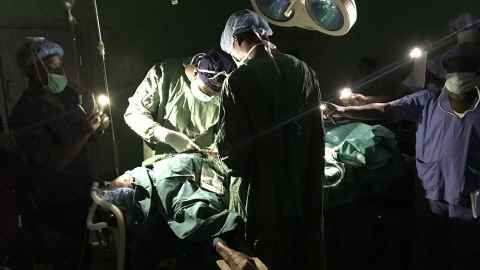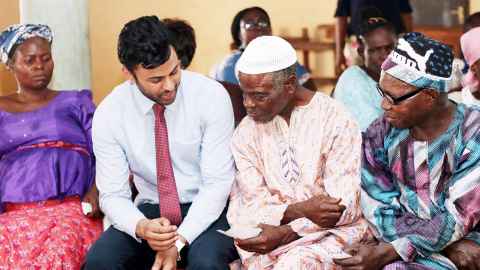Uncharted research
19 October 2018
In an ancient city of Nigeria, alumnus Dr Avinash Sharma operates on a patient in the dark.

A power outage has struck again, but the torchlight from his colleagues’ cellphones allows him to continue.
There’s no mechanical ventilator, just a dutiful nurse squeezing the manual resuscitator, acting as the patients’ lungs until they wake up.
It’s an exercise in resourcefulness, unheard of back in New Zealand. But, at Obafemi Awolowo University’s teaching hospital in Ile-Ife, blackouts happen weekly, sometimes for days at a time.
For six months, this was Avinash’s job, as well as teaching at the university and conducting novel research. His work was part of the inaugural Global Cancer Disparities Fellowship, from New York’s Memorial Sloan Kettering Cancer Centre.
The 36-year-old’s research focus was breast and bowel cancer, both of which present at an earlier age than in developed countries and are more aggressive.
As part of the research project, he created a breast cancer tissue biobank to study immunohistochemistry and tumour microenvironments. He collected 300 stool samples from people in the community, to document each individual’s microbiome, the unique bacterial footprint of the gut.
“It’s uncharted territory, so it’s really exciting to be a part of that. With one eye on the future, I think there are definitely parallels that could be made with cancer care in the Pacific, and again, marginalised communities,” he says.
Despite the unstable political environment, Avinash felt safe in Nigeria, but always erred on the side of caution.
“In the southwest and the town I was in, things were good, being in the hospital and university environment with a lot of security. I know that the northeast is a lot more unsafe where Boko Haram operates.
You have to be sensible when you are in the area and respect what the locals tell you. I made some amazing friends and formed life-long connections with some very inspiring individuals.”

Avinash also had his own health challenges to deal with, despite being on prophylactic medication.
“I managed to contract malaria a couple of times. It was quite an ordeal, but it was a very realistic experience of what day-today life is like in the region.”
Avinash has lived in Manhattan, New York, since January 2017 and is based at the Memorial Sloan Kettering Cancer Centre, where he is training in surgical oncology. He loves the atmosphere of the city that never sleeps, but misses New Zealand too.
He completed his medical degree in 2006 and worked as a junior doctor for a year. He then lectured at the University of Auckland in the Department of Surgery, and later completed a masters in public health at the University of Oxford. In 2016, he completed surgical training with the Royal Australasian College of Surgeons. He qualified to work in the United States in 2017 and in August of the same year, he finished his doctorate at the University of Auckland. His time here equipped him with the skills to hit the ground running as a house surgeon.
“I think we have a really good programme; the immersion into clinical from third year is fantastic. The medical graduates get really good exposure in their clinical years and you feel very prepared.
I think that’s unique compared to what I have seen of some of the residents in the United States and the training they get.
“I’ve been fortunate to have worked with professors and senior academics who have had international standing and that’s opened up doors for me, so I’m very grateful to them in New Zealand.
“When I was studying my masters there was something that hit home to me, that 90 per cent of the world’s resources are used in treating 10 per cent of the world’s population. When you think about that, you realise something’s not quite right.
“The dream would be to come back [to New Zealand] and pursue some of my research interests I’ve been able to start working on abroad.
By Briar Hubbard
Ingenio: Spring 2018
This article appears in the Spring 2018 edition of Ingenio, the print magazine for alumni and friends of the University of Auckland.